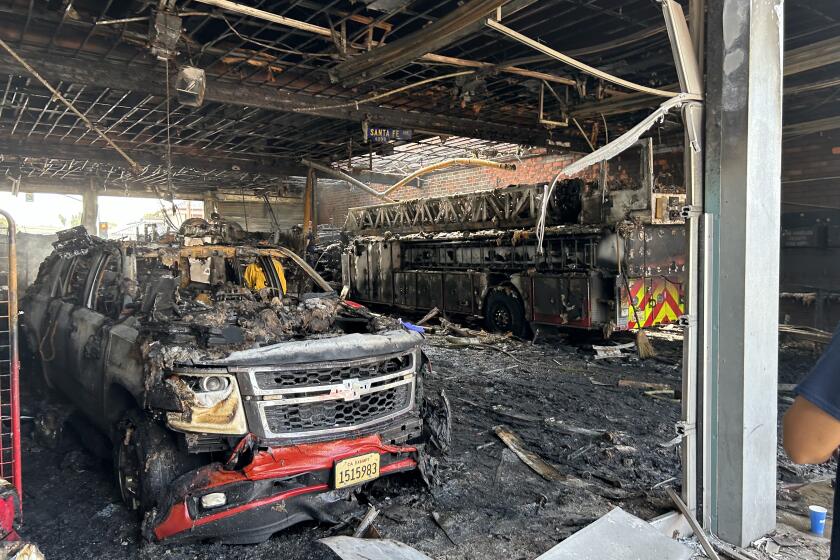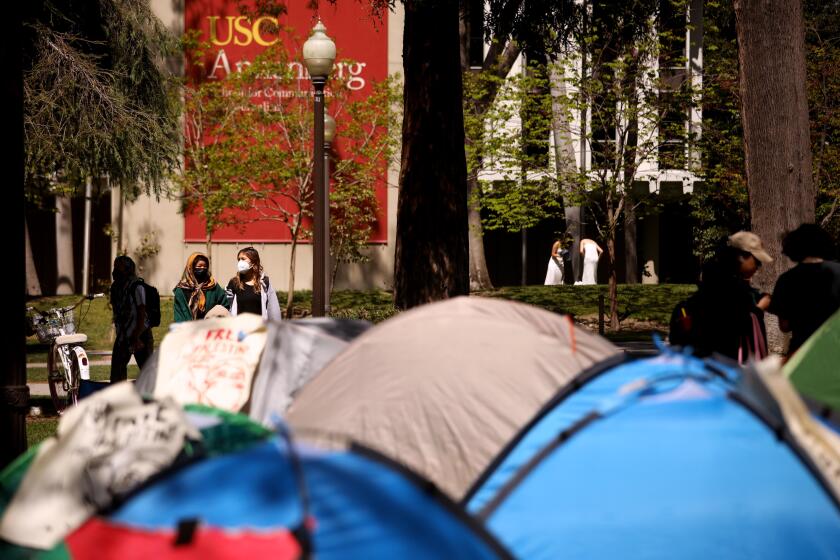Police Brass Press for an Extra $4.8 Million
As Los Angeles Police Department commanders return to the debate over how much policing the city can afford, they appear resigned to six-month delays for many of their proposed changes. That includes $27 million to hire 320 new officers and to buy patrol cars.
What can’t wait, they said, is the $4.8 million that will fund the cornerstone of Chief William J. Bratton’s permanent reforms, reorganization.
“The most pressing issue when it comes to the budget is the reorganization,” Bratton said. “It might seem like a small amount of money to some. But it’s vital to turning around this department and this is money we need now, not later.”
Over the objections of Bratton and Mayor James K. Hahn, the Los Angeles City Council approved a $926-million budget for the department but delayed funding for several key Bratton initiatives, saying that nothing more can be spent before next year. The debate grew heated, with the council accused of ignoring public safety. Hahn and Bratton muted the rhetoric this week, and are maneuvering to salvage what they can.
But law enforcement officials said Wednesday that even if there is a midyear adjustment in LAPD funding, programs critical to the department’s reorganization will be hurt now: anti-terrorism and anti-gang efforts and department reforms.
They said that delaying the $4.8 million means that police will be less able to respond to emergencies, less likely to communicate effectively with other law enforcement agencies committed to anti-terrorism, less likely to respond adequately to gang threats and will fall further behind in implementing post-Rampart reforms.
About 90% of the LAPD budget pays for salaries and benefits, giving the department no wiggle room in finding money elsewhere in the budget, said Assistant Chief George Gascon on Wednesday.
That also is reflected in the reorganization plan delayed by the council, which over the next six months would have cost $4.1 million for salaries and related expenses and $635,000 for one-time costs and equipment. The money would cover six months of operations.
The reorganization funding would pay for 101 new positions and unfreeze 150 vacant positions. But it also serves a larger purpose: filling the command ranks with the supervisors, detective commanders, sergeants and lieutenants of Bratton’s choice, said LAPD Assistant Chief Sharon Papa.
“You can’t have officers out there as free agents,” said Papa, adding that the department still needs to learn the lessons of the Rampart corruption scandal. “You have to have supervisors out there guiding officers and monitoring their activities.”
Los Angeles City Councilman Jack Weiss said he agrees that the reorganization is a priority. But he said the city can’t afford any financial missteps, which would put it deeper in the red and cause further cuts in the future.
“It’s incumbent upon everyone, including the mayor’s office, to search for additional sources of revenue and to acknowledge the essential fact that we learned during the budget hearings, that the city’s financial future is precarious and if anything close to the [revenue] predictions comes true, things will get even worse in these priority areas,” Weiss said.
Bratton wants 18 new sergeants and 18 new lieutenants to head up teams fighting street gangs, the major factor in the city’s rising murder rate.
Those gang teams were envisioned as part of a larger Special Operations Bureau. In that bureau, Bratton wanted a 13-officer strike team to respond rapidly to gang shootings.
With big cities on the potential hit list for terrorists, Bratton has stressed that Los Angeles needs a counterterrorism bureau that will circumvent terrorism rather than react after the fact. Put on hold by the council is his proposal to create 55 jobs to bring total anti-terrorism staffing after the reorganization to 249 positions, 230 of them sworn and 19 civilian.
Other anti-terrorism initiatives that have been delayed are the creation of a specialized unit to respond to hazardous-materials emergencies, emergency planning and detailing officers to work with the U.S. State Department, foreign consulates, other U.S. police agencies and prisons to gather intelligence.
The third and final area of major concern to the Bratton administration is devoting resources to ensure that the department complies with its promised reforms sought by the U.S. Justice Department.
To achieve that, the department must be in “substantial” compliance with improvements in a court consent decree by June 2004 to meet the June 2006 deadline. It is one of Bratton’s most emphatic goals.
But with reorganization on hold, the department must wait to hire the nine people it said it needs for its audit division. It was here where a federal monitor questioned whether the city was committing the proper resources for reform to succeed.
More to Read
Start your day right
Sign up for Essential California for news, features and recommendations from the L.A. Times and beyond in your inbox six days a week.
You may occasionally receive promotional content from the Los Angeles Times.







